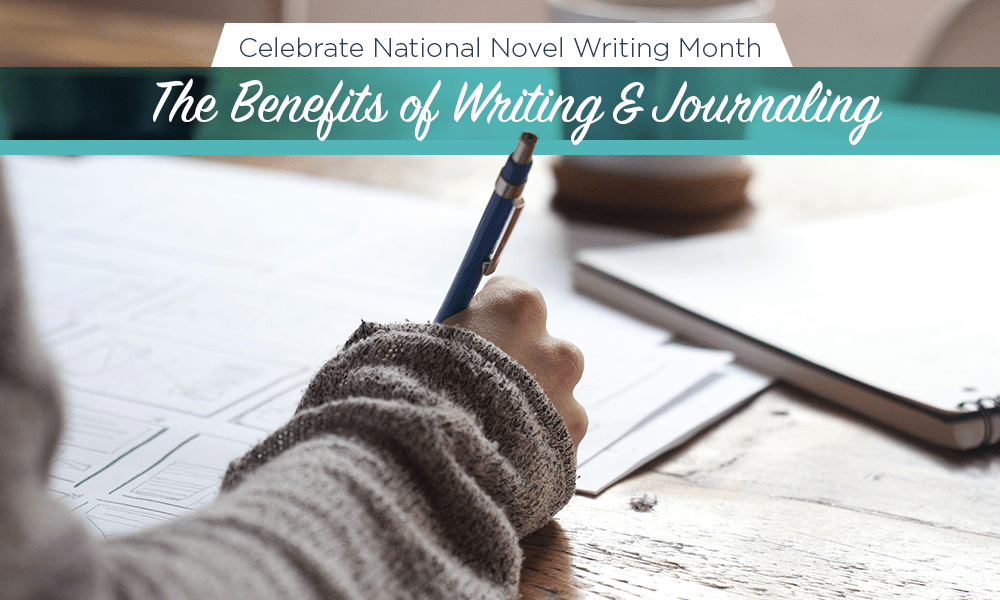November is National Novel Writing Month, or NaNoWriMo. The goal of NaNoWriMo is to write 50,000 words of a manuscript in one month. But, you don’t need to be working on a novel to celebrate the beauty of writing this month. There are countless benefits of writing, journaling, and creativity that you can enjoy year-round, whether you’re the next Ernest Hemingway or you’re just getting started on your first journal.
Learn more about the benefits of writing and journaling and how to incorporate more writing in your life (even if you can’t remember the last time you picked up a pen and paper!).

The Benefits of Writing
There are many benefits of writing, including strengthening your mind, emotional intelligence, and wellbeing. Here are some studies to prove it:
- Writing can help you communicate better. In both emotional intelligence and in hard sciences like mathematics, writing has been shown to help people communicate highly complex ideas more effectively. The task of committing your thoughts to paper can help you to better convey your feelings and experiences.
- Writing can help you cope with hard times. In this study, engineers that were fired from their jobs that were “assigned to write about the thoughts and emotions surrounding their job loss were reemployed more quickly than those who wrote about non- traumatic topics or who did not write at all.”
- Writing can help clear your mind so you can focus on a few things, rather than suffer from brain overload. We all have a million thoughts going on at once and getting important ideas down helps you to not lose track of your thoughts due to an overcrowded mind.
- Writing can make you smarter. According to a report by the University of Victoria, “writing as part of language learning has a positive correlation with intelligence,” which some researchers argue can help you increase your IQ score.
While using a laptop or computer to write is better than nothing, you actually will receive even more benefits by physically writing with a pen and paper compared to typing. In a study published in Trends in Neuroscience and Education, researchers compared the MRI brain scans of children who were told to either write a letter, type it, or trace it along a dotted line. The kids that hand wrote the letter activated three distinct areas of their brain.
These findings extend to adults, as well. The more you use the neural pathways it takes to handwrite letters, the better it is for your overall brain health. This lifelong learning may be able to keep your cognitive abilities strong. In addition, handwriting your notes during meetings or lectures can help you retain important information better.

The Benefits of Journaling
Journaling is one form of daily writing that many people find enjoyable, and for good reason! Here are some of the main benefits of journaling:
- Journaling can help you achieve your goals. Research published in SAGE Publications shows that writing about achieving future goals and dreams can make people happier and healthier. Five months after the study, “writing…decreased illness compared with controls.”
- Journaling can help you be more grateful. In this study published in Harvard Health Publishing, participants were asked to either write about things they were grateful for, things that had displeased them, or neutral events once a week. After 10 weeks, “those who wrote about gratitude were more optimistic and felt better about their lives. They also exercised more and had fewer visits to physicians than those who focused on sources of aggravation.”
- Journaling can help you be more mindful. Writing down what’s on your mind can help you focus on the moment and decrease thoughts of anxiety or frustration. This is a form of meditation.
Journaling can help boost your memory. Having to write down your thoughts and ideas forces your brain to re-compose these ideas again and again. This is called cognitive recall and is a powerful tool in the fight against the aging mind.

How to Incorporate More Writing Into Your Life
You don’t need to be a New York Times bestselling author to enjoy the many benefits of writing and journaling. In fact, even small habits will lead to increased creativity, emotional intelligence, and enjoyment. Here are some tips to get started:
- Invest in a journal and pen set that you really love. The more you enjoy what you’re working with, the more likely you are to make writing a habit.
- Keep your journal somewhere that you see every day, such as on your nightstand or at your desk.
- Anchor your writing to a daily habit, such as brushing your teeth or eating breakfast. Studies show that anchoring a new habit to an existing habit increases consistency.
- Start small. Even writing a paragraph a day will help you get started.
- Don’t worry about perfection. Just focus on getting your thoughts down.
- Not sure what to write about? Start with a writing prompt. These prompts will help you get started if you’re facing writer’s block.
- Set a timer and write for a designated amount of time. Only focus on writing during this time period and stick to it, even if you don’t think you have anything to write about.
- Don’t judge yourself too harshly. We are our own worst critics, so try not to get in your own way.
November is the perfect time to start writing and enjoying the many benefits that come from this therapeutic and cognitive practice. Exercise your mind, get your thoughts on paper, and practice gratitude this holiday season.


